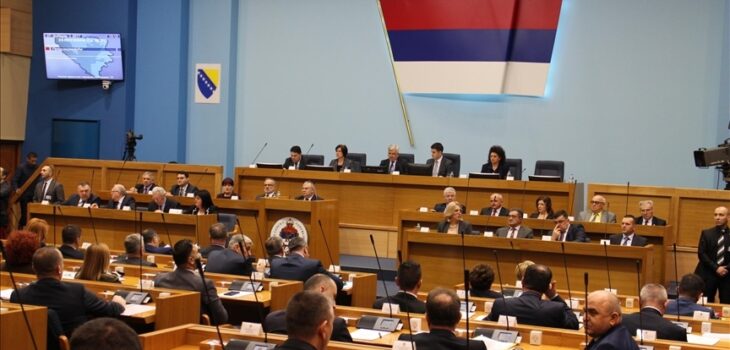
On 18 July, Republika Srpska’s National Assembly will vote to re-introduce criminal penalties for defamation. Media Freedom Rapid Response partners urge deputies to reject these amendments, as they would suppress journalism and public discourse across the country.
Members of the National Assembly in Republika Srpska, one of the two entities of Bosnia and Herzegovina, are called to vote on 18 July 2023 on the draft Law on Amendments to the Criminal Code, which would re-introduce criminal penalties for defamation. The Media Freedom Rapid Response (MFRR) partners call on deputies to vote against these amendments, which would stifle journalism, public debate, and civil discourse, not only in Republika Srpska but across the whole country.
Our organisations have warned of the dangers of criminalising defamation as draft amendments were introduced in March 2023. Since then, public discussions have taken place without addressing the concerns of the national and international journalistic communities, and in particular the risk of abuse of the new provisions to intimidate and silence journalists.
As a matter of principle, we remain opposed to any criminalisation of defamation. Nevertheless, compared with the initial draft, we welcome that in the latest version of the bill up for discussion in the Assembly tomorrow, proposed fines for the criminal offence of defamation have been lowered, from a proposed range of BAM 8,000-100,000 originally to BAM 1,000-6,000 in the latest version. Similarly, we welcome that newly introduced language now offers some protection of speech that is in the public interest
In a legal analysis of the suggested amendments published in April 2023, ARTICLE 19 Europe stated that the punitive nature of the applicable sanctions renders them to be a disproportionate interference with free speech. In addition to the problematic criminalisation of defamation, a particularly dangerous provision (Article 156a) provides for specific conduct (certain violations of privacy with a defamatory element) to be punished by imprisonment, which would lead to egregious violations of the right to freedom of expression and stifle civic discourse and the work of the media. Onerous financial penalties and the very process of criminal prosecution are a disproportionate response to the protection of one’s reputation. The defences against prosecution stipulated in the proposed legislation are insufficient to protect the possibilities to engage in a debate on issues of public interest, including through criticism of politicians and other public figures.
Our organisations have long opposed any law criminalising defamation, in line with international standards. We consider criminal defamation laws as unnecessary and disproportionate measures, violating the right to freedom of expression and contributing to a “chilling effect” on journalism and public debate. Where appropriate, alternative remedies such as a publication of a retraction, apology, or correction and the right of reply, constitute a better response to an unjustified attack on one’s reputation.
We reiterate our call on members of the Republika Srpska National Assembly to reject the amendments in their entirety.
Signed by:
- ARTICLE 19 Europe
- European Federation of Journalists (EFJ)
- European Centre for Press and Media Freedom (ECPMF)
- Free Press Unlimited (FPU)
- International Press Institute (IPI)
- OBC Transeuropa (OBCT)
Source: MFRR



